Especially in today’s competitive job market, securing an interview for an HR role is a big deal. It means, after initially viewing your LinkedIn profile or CV, the hiring manager was interested in you enough to dedicate more time to get to know you better. Whether you’ve already landed that coveted interview for an HR role, or you’re still looking for the right one, we can help you make the most of your skills and experience. Keep reading for info on securing an interview, how to prep for an HR interview, and what kinds of interview questions to expect.
How to secure an interview for an HR role
Your CV is usually your chance at a first impression with a hiring manager, so of course, having an excellent one is key. There are all the usual things, like your contact information, education and work history. But there are other elements that are very necessary for a good CV when you’re applying for a role in HR.
Introduction
Keep this section brief, using it to summarise your CV and highlight your main achievements. It should draw the hiring manager in and make them want to keep reading.
Education and qualifications
In this section, list any degrees you have, including the university you attended, the start and completion dates, and the degree level.
Then, list your relevant HR qualifications. List them all, in reverse chronological order according to completion date, and make sure you include the examining body for your HR-specific ones. List out any exams you passed, too.
Skills profile and further training
This is where you can show off the skills you have that are directly applicable to the job you’re applying for. Use bullet points or a numbered list, and be as specific as possible, using relevant key words like resource planning, talent acquisition or management.
Soft skills
If you’re new to HR, you can lean on your soft skills, especially since good HR candidates need to be organised, personable, able to take initiative, and prepared to work hard. Things like first aid courses can be listed here, as well.
Work experience
Starting with your most recent role, and for each one, include:
- Company name and description
- Your job title and length of time you worked there with dates
- A brief list of responsibilities
- Achievements or areas in which you excelled, and quantify this if possible
A few extra CV tips:
- Update it regularly with new roles and qualifications
- Adapt your CV according to the role’s particular HR vertical
- Account for any career gaps and be prepared to speak to them
- Keep everything clear, concise and informative

How to prepare for an HR interview
If you’ve got your meeting arranged, congrats! Here’s how to prepare for an HR interview.
- Research the company you’re interviewing with. Take in as much information as you can about the business, read their entire website, look at all their social media platforms, and look up the latest news about them. You can’t be too thorough here.
- Research the person who is interviewing you. Look at their LinkedIn and understand their path to the company, as well as their past experience. Be prepared to ask them questions about their role and their time at the company.
- Carefully read the job description and understand every point, as well as how your own skills fulfil all the requirements. If there is a gap, don’t worry, just be prepared to explain and use some of your soft skills or other applicable experience to fill it.
- Review your CV and be prepare to answer questions about it, as well. From why you want to leave your current role or what you did and didn’t enjoy about past roles, it’s good to have a handle on your career progression.
- Prepare answers to any questions you think you might be asked. More on that in the next section.
Examples of HR interview questions
Below are some examples of common HR interview questions you may encounter and sample answers you can use to guide your own.
1. Sample question: Why are you interested in this position?
HR pros are likely trying to get you to reiterate your strengths and highlight your passion for both the company and the role. Talk about your past experiences and how they apply to this job, and link what you’re saying back to what they’ve said and to the job description.
Answer:
After working in learning and development for seven years, I truly appreciate the power of an HR team to truly impact the whole organisation. As an HR manager, I would apply my ability to create the best environment for my colleagues to thrive in and help them do their best to further organisational goals. I have done this in past roles, and I know I can apply my skills here, as well.
2. Sample question: Tell me about yourself.
For this one, you need to give a compelling answer without rambling too much about personal things. Doing a SWOT analysis is a good approach, analysing the sector, the company, and the job, finding opportunities to market yourself.
Answer:
I have been an HR manager for seven years, with experiences that include leading an HR team to create the best possible environment for our colleagues. I know that your organisation has a great retention rate, and it would be my personal mission to maintain that. In previous roles, I helped increase my company’s retention rate at a steady in just my first year, and maintained it throughout subsequent years. Essential here: Figure out what the company’s HR goals are, and tailor your answer to them.
3. Sample question: Tell me about a time in your past when you had to handle confidential information.
If you have had to handle private information in past roles, discuss that. If not, talk about a time when you were privy to private information while helping a colleague. Focus on your ability to work with integrity and a respect for people’s privacy.
Answer:
In my past roles, I have always had to deal with my colleagues’ private information. I understand how detrimental it would be if I didn’t take every precaution with that information, both for that person and for the company. I only access this kind of information when I need it, I never share it with unauthorised colleagues, and I keep it saved I a secure location.
4. Sample question: Have you ever helped an employee deal with a personal problem that was affecting them at work?
You should have examples for this one if you have worked on HR teams in the past. If not, use other relevant examples from your past roles, or a more personal example.
Answer:
I have, and I’ve found the most important thing here is to be empathetic, but also remain professional. I listen carefully to understand the problem, and how it is impacting the person’s day-to-day tasks. I ask them how I can help alleviate some of that stress during their workday, and if their job is contributing to that stress in any way. Then, I work to make a plan with them to help manage that problem during work hours.
5. Sample question: What do you believe the role of an HR department is, and how does it relate to the mission of a business?
Here, give a general answer that shows you understand HR, and how it connect to organisational goals, then provide specific examples that relate to the company.
Answer:
Through my seven years working in HR, I’ve come to understand how HR can affect every aspect of a business. It plays a real role in growth, from recruitment to restructuring to business strategy. People are a company’s most important resource, and having a solid HR department that protects and supports those people can only have a positive impact on the organisation.
How to follow up after your HR interview
As soon as possible following your interview, send a thank you note to the person who interviewed you. Thank them for their time, tell them you enjoyed meeting them and learning more about the company, and remind them that you’re available to provide any further necessary information.
If in the unfortunate case that you aren’t successful, be polite and gracious. You never know when they might be hiring again, and if they really liked you, they’ll remember you the next time they’re recruiting.
To be prepared for that occasion, ask the interviewer for specific feedback. Ask them if there are certain gaps in your CV that a course could fill, or if they were looking for different experience that you could work to gain in your current role.
Good luck!
About Avado
At Avado, we believe that true transformation isn’t digital, it’s human. We build professional future skills to help diverse talent access and accelerate careers through award-winning learning experiences that deliver tangible and measurable impact. We upskill people, uplift culture and future-proof organisations in a fast-moving world.
Avado is proud to be a people-transformation partner to some of the largest and most innovative organisations in the UK including: Google, BT, NHS, British Airways, UK Civil Service, Legal & General and AstraZeneca.
Check out Avado, the UK’s most trusted CIPD course provider today for HR and L&D courses:
CIPD Level 3 HR Courses: The CIPD Level 3 Certificate in People Practice is ideal for anyone looking to start a career in either HR or Learning and Development.
CIPD Level 5 HR Courses: The CIPD Level 5 Associate Diploma in People Management will help you build on your existing HR knowledge.
CIPD Level 5 L&D Courses: The CIPD Level 5 Diploma in Organisational Learning and Development is the most comprehensive course available for L&D professionals, ideal for you if you want to formalise your existing experience, skills and knowledge.
CIPD Level 7 HR Courses: The CIPD Level 7 Advanced Diploma is aimed at expanding learners’ autonomy so they can strategically direct organisations and their people.

 9 min read
9 min read 




